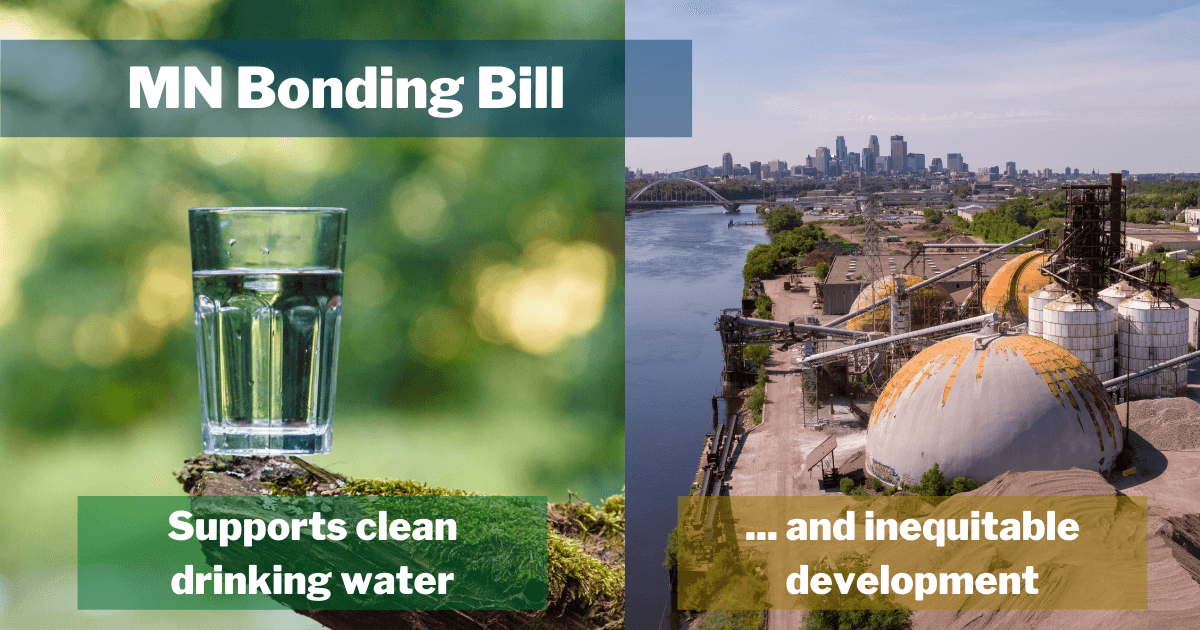Minnesota approves historic bonding bill
After negotiations failed during the regular session plus no fewer than four additional special sessions, the Minnesota Legislature achieved a breakthrough for the state’s economy and public health with the passage of a bonding bill during special session number five.
Bipartisan majorities approved the $1.8 billion package in the House (100-34) and Senate (64-3), securing more than $302 million for statewide water infrastructure. Sadly, the bill also funds a project we strongly oppose: the Upper Harbor Terminal concert venue in Minneapolis.
Let’s unpack the final product.
The good: Fix The Pipes MN
This bipartisan legislation will fund much-needed investments to upgrade and repair outdated pipes, wells, water treatment plants and other systems that provide Minnesotans with safe drinking water, safeguard communities from flooding, and protect lakes and rivers from pollution.
FMR is a proud member of #FixThePipesMN, a nonpartisan alliance of city, business, labor, engineering and environmental leaders in Minnesota. The alliance came together because Minnesota is home to some of the nation’s greatest water resources, and we know that investing in the systems that keep them clean now will pay off for decades to come.
Our goal was to secure at least $300 million in water infrastructure investments. We're thrilled to say that the final package exceeded that, with $302,597,000 going towards clean water in Minnesota.
The water projects in this bill alone are estimated to create more than 7,000 jobs and generate $1.8 billion in economic activity across Minnesota.
“Minnesota’s workers are ready to repair and replace drinking and wastewater systems around the state,” said Bree Halverson, Minnesota Regional Program Manager for the BlueGreen Alliance, a coalition of labor unions and environmental organizations in the alliance. “The bill passed by the Legislature will create the jobs we need to jumpstart our state’s economy and help our state get back on track economically, all while reducing water waste and ensuring Minnesotans have safe drinking water."
Specifically, the final package includes important investments in the “big three” water infrastructure programs in Minnesota:
- Wastewater Infrastructure Fund ($55.49 million)
Grants from this fund will support municipalities taking on high-cost clean water and drinking water infrastructure projects that address existing environmental or public health problems. Wastewater Infrastructure Fund dollars can either supplement low-interest loans from the Clean Water Revolving Fund or match grant and loan funding from the U.S. Department of Agriculture Rural Development program. - Point Source Implementation Grants ($44.55 million)
These grants help local governments build wastewater, stormwater and drinking water treatment projects when the Minnesota Pollution Control Agency determines that higher levels of treatment are necessary to meet water quality goals. Funding is allocated on a competitive basis with grants covering up to half of the eligible costs with a local match required. - Water Infrastructure Initiative ($25 million)
This money will increase the lending capacity of the Clean Water and Drinking Water revolving funds. State and federal funds are used together with loan repayments and Public Finance Authority revenue bonds to provide low-interest loans to local governments for clean water infrastructure, which includes wastewater, stormwater and drinking water projects. Eligible projects are prioritized based on environmental and public health criteria.
In addition, the bill makes important investments in other clean water projects, including:
• $144 million for 30 different community water infrastructure projects across the state (a few examples from FixthePipes.org)
• $8.5 million in long-overdue state match for the Minneapolis Central City Storm Tunnel
• $7.2 million in funding for hazardous cleanup projects in Esko & Minneapolis
• $5 million for municipal stormwater inflow and infiltration repair
• $1million for the Conservation Reserve Enhancement Program (CREP)
While we're disappointed the bill didn’t invest in the governor’s proposed climate resilience fund or provide more for the Conservation Reserve Enhancement Program, overall, it represents a historic investment in Minnesota's clean water infrastructure. Gov. Tim Walz is expected to sign the bill.
The bad: UHT concert venue
We're disappointed with one item funded in the bonding bill: $12.5 million to build a controversial concert venue at the Upper Harbor Terminal in North Minneapolis.
FMR has long raised concerns about whether this 7,000-10,000 person concert venue, which First Avenue plans to operate, will really deliver equitable opportunity and wealth-building for Northsiders.
The site is owned by the City of Minneapolis. So now the site's private developers not only get to build on public land but have state taxpayers' dollars pave the way.
FMR and many others are concerned this riverfront redevelopment could lead to gentrification and displacement. In the wake of George Floyd's murder and a pandemic-induced recession, was this really the time for the City of Minneapolis to ask the state to subsidize some of Minnesota's wealthiest families instead of, say, prioritizing funding for affordable housing or rebuilding businesses? (Read more about our take on Upper Harbor Terminal.)
Thank you!
A special thank you to FMR’s River Guardians, who took action to help support this historic water infrastructure bill.
While we didn’t get everything we wanted (and got something we didn’t want) – on balance the bill is a remarkable statement that once again demonstrates that nothing brings Minnesotans together like protecting clean water.
If you're not yet a River Guardian — join us! Sign up to be a River Guardian to receive email action alerts when we need your help the most, plus invitations to educational happy hours and other events.
